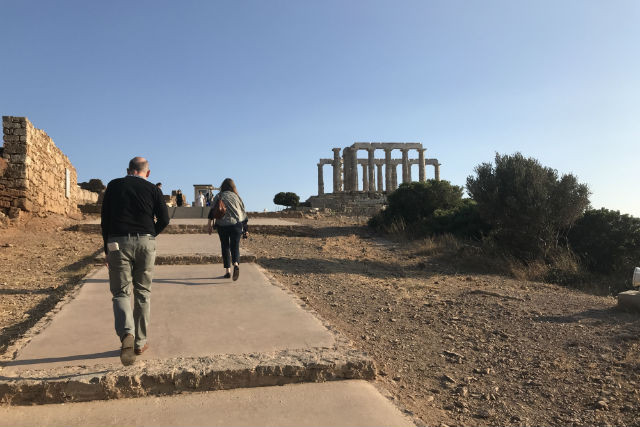Tell anyone to picture modern-day Greece and most will conjure up media images of displaced people in open boats fleeing war. For tourists looking to escape the daily grind, this distorted view of the country was not appealing.
“A lot of people called us thinking it wasn’t safe,” Greece’s national tourist organisation representative to Benelux Angeliki Tzifa told Delano during a press trip in June. “We explained many times that it was but when you see TV news with demonstrations and refugees, you could easily think you will visit the Acropolis and see a boatload of refugees.”
Given that tourism accounts for a fifth of the country’s GDP, leaders and tourism actors have rallied to bring them back.
Gastro-tourism
Stamatis Mylonas is among the pioneers helping carve a new niche for their country. The third generation of a family of winemakers, he took over his father’s sprawling vineyard south of Athens on the Attica peninsula in 2006. “My father used to only sell wine in bulk,” he recalled, adding that he would even buy in grapes from other growers to increase capacity. “We shrank production because my father used to sell a lot of bad wine and we went to high quality production. Less but better and more expensive.”

Photo: Maison Moderne. Yoleni's in Athens is part of a franchise selling high-quality Greek produce
Today half of the 70,000 bottles of his Savatiano and other varieties are exported to the US, a market which he has been slowly working on over the years. Mylonas and other winemakers like him are transforming the reputation of Greek wine, once confined to “bad retsina”, and in doing so, attracting the new breed of tourists.
Further proof of the popularilty of this new kind of gastro-tourism is found in downtown Athens in Yoleni’s, a buzzing grocery store selling high-quality produce from all over Greece. The shop and café, which opened in 2016, is part of a franchise with a second in Boston, USA. To understand the clientèle they are attracting visitors need only head for the fourth floor where they have installed a large playroom for customers’ children.
Extended season
All over Greece, high levels of optimism in the tourism industry can be seen in the number of new hotels being built--254 according to recent figures from the tourism ministry. It adds that an additional 25,000 new beds have been added to existing 4 and 5-star hotels since 2013, of which 12,000 were in 2017. This is largely thanks to a simplification of licensing procedures, modernising operating criteria and standards.
Tourist numbers, meanwhile, are improving to pre-crisis levels with over 30 million visitors recorded in 2017. However, entrepreneurs are not leaving anything to chance and are working towards extending the tourist season.
“What we noticed is even if you have the most beautiful hotel, all inclusive, if the tourist comes to a destination and wants to visit a taverna or buy something and everything is dead, it doesn’t work,” Tzifa said. She explained that in 2018 tour operators, hoteliers, restaurateurs and other businesses in Crete have agreed to stay open in October as part of a pilot project.
“It’s a kind of experiment to see how it will work.” Crete’s moderate climate makes it the ideal testing ground for this partnership. But it is not the only destination that can be reached “out-of-season”. Aegean Airlines is this year extending its seasonal flights into October.

Photo: Maison Moderne. Lefteris Kretsos, general secretary for information and communication at the digital and telecommunications ministry, pictured on 9 June
Audiovisual & media makeover
For Greece’s last major tourism magic trick it has turned to TV and cinema, offering generous grants to audiovisual productions made in the country.
“Greece is a country with a diverse location. It has the most magnificent ruins. It has wonderful, film-friendly weather,” Lefteris Kretsos, general secretary for information and communication at the digital and telecommunications ministry told Delano on 9 June. "But it’s a country where you see locations are filmed in places like Switzerland and Germany, Africa or the Middle East,” he added.
One example of this is missed opportunity is the “Mamma Mia!” sequel, a movie set in Greece but filmed in Croatia. The new grant, which offers a 25% cash rebate on expenses paid upon completion of the production, is the first step in a new direction which Kretsos hopes will take Greece almost effortlessly into homes globally through VOD.
A total €75 m has been earmarked for the scheme over the coming five years. Kretsos accepts “there’s a long way to go” before Greece’s reputation as a film destination matches that of its tourism image. Work will need to be done to boost digital skills and to remove the red tape around filming historic sites. But with plans to establish a film office in 7 cities, he says “It’s the first time in Greece we see optimism about media and audio-visual industry.”
